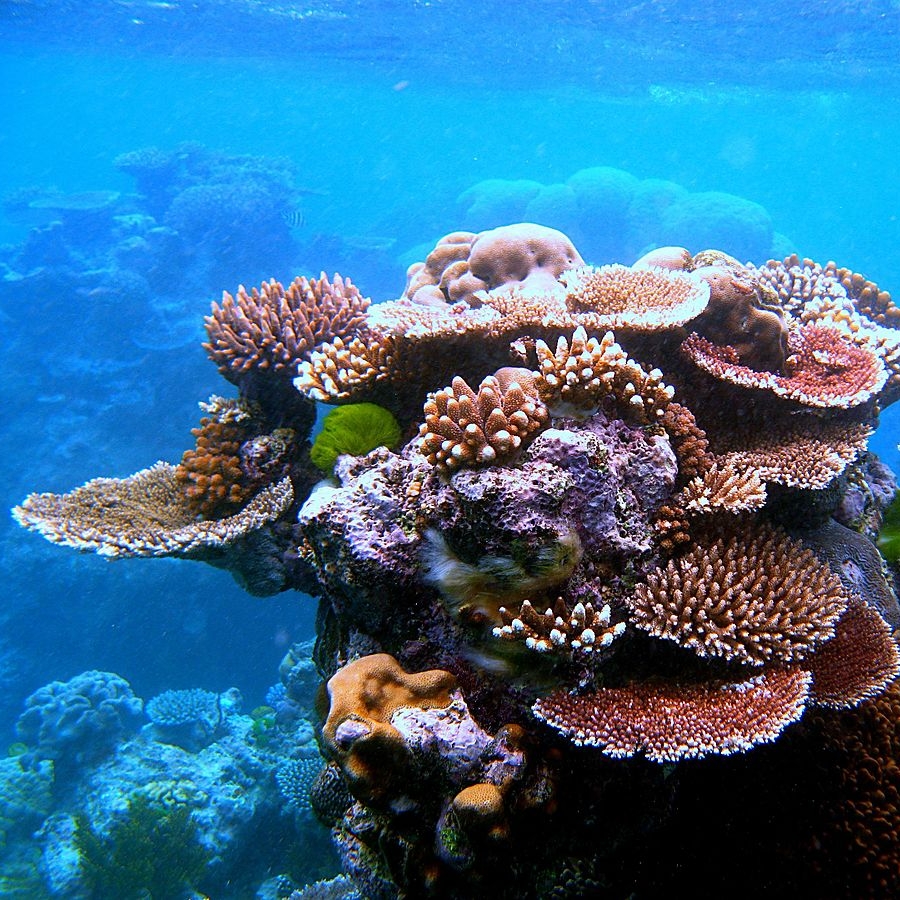Hypoxia on tropical coral reefs

This is a project about the role of progressive hypoxia during night on tropical corals and reef inhabitants. Coral is a colony-living animal with a symbiotic alga (zooxanthella) inside its tissue that provides ca. 80% of the coral’s energy. Sugars and oxygen are produced during daytime, but at night all organisms on the reef, including corals and zooxanthellae, use oxygen. The result is a daily rhythm of hyperoxia during day and progressive hypoxia build-up during night. We argue this is an uncompromising bottleneck that all reef organisms are adapted to.
This project will embrace theoretical and empirical work integrating ecology, physiology and behaviour within life history to better our understanding of what is happening in the heat of the night in these valuable ecosystems.
Background
Coral reefs are now the first major ecosystem to suffer extensive damage from global change, threatened by rising temperatures, ocean acidification and hypoxia. It is well-known that temperature and hypoxia affect coral bleaching. Within the realm of eco-physiology, impacts of warming on fish performance have been studied extensively. However, there is an important knowledge gap on how and when hypoxia causes coral bleaching and how oxygen availability affects life history strategies of reef organisms.
Hypoxia occurs naturally on reefs at night and the coral-zooxanthellae symbiotic relationship undergoes a natural stress test every dawn when oxygen levels are at minimum. Also, small fish hiding within the coral at night suffer daily hypoxic conditions. Yet even under these extreme conditions the fish remain within the coral. An important ecological trade-off and/or physiological constraint must therefore exist. In this project we argue that hypoxic conditions during night and the ensuing trade-offs with predation risk must be critical in explaining life strategies for reef inhabitants.
Aim and objectives
Our aim is to test, document, and refine our key hypothesis that late-night hypoxia is a daily bottleneck that structures physiology, life history, behaviour, and biodiversity in corals and reef-dwelling fish.
Our research questions:
1: How does late-night hypoxia act as a bottleneck for adaptations in corals and reef-dwelling fish?
2: Can the spatial gradient in night-time hypoxia from reef edge to reef interior explain a pace-of-life gradient and sustain biodiversity?
3: How does hypoxia during the warm season structure reef biology via phenology and opportunity?

Conceptual scheme of some hypothesis about how hypoxia during night and the ensuing trade-offs with predation may determine slow growth and behavioural strategies in coral-dwelling fish
Our approach
This project will combine theory and modelling, laboratory experiments, field observations, and mining and analysis of published data.
A modelling-testing-modelling cycle enables strong inference: modelling and theory development will be used to derive alternative hypotheses. The predictions from these will be tested in experiments and challenged with analyses of published data and new field observations to refine the hypothesis, revise the models, and make new predictions.

Working flow involving a cycle of induction and duduction thinking.
• Modelling and theory: We will develop evolutionary life history models for fish and corals by detailing the role of progressive hypoxia overnight.
• Physiological and behavioural methods: We will measure sensory performance, metabolism and hypoxia tolerance in a broad species range. Experiments in Norway will be used to test hypotheses and fine-tune methods for physiological experimentation in the original tropical system at the Lizard Island Research Station.
• Field observations during night: What happens on the reef at night? Our understanding of behavioural ecology is biased towards daytime. Here, we will film with new technology at night to establish nocturnal biology as a field that merits its own discipline.
•Data mining and analysis: We will take theoretical predictions further by challenging them with useful and significant data. We will compile a dataset for growth, life history and metabolism for a broad species range, and reanalyse for interactions between bleaching events, temperature, daylength, metabolism, etc.
Latest news
 Our project on hypoxia on tropical coral reefs is starting up
Our project on hypoxia on tropical coral reefs is starting up
That Andrea Campos-Candela and Rachael Morgan begin their postdocs marks the start of our project on effects of hypoxia for tropical coral reefs and the fish that live there.
[5 August 2021]
Project team
 Andrea Campos-Candela
Andrea Campos-CandelaPostdoc
I am a (theoretical) ecologist enthusiastic in bringing together theoretical ecology and empirical science, by integrating experimental, field and modelling perspectives and methods.
 Project partner: Rebecca E. Holt
Project partner: Rebecca E. HoltResearcher at the Centre for Ecological and Evolutionary Synthesis (CEES) at the University of Oslo, Norway
I am a quantitative ecologist interested in the effects of environmental variability, climate and fishing on the marine environment. My research centres on predator-prey interactions, population dynamics, and the effects of temperature on species behaviour and life-history strategies using spatio-temporal statistical models and mechanistic modelling techniques.
 Rachael Morgan
Rachael MorganResearcher
I am an ecophysiologist interested in understanding the mechanisms by which fish are able to acclimate and adapt to a changing climate. In particular, my research focuses on the effects of hypoxia and high temperature in tropical fish species.
 Christian Jørgensen
Christian JørgensenProfessor (Group Leader)
I work with adaptation as a tool to build models that scale mechanisms at the individual level to population-level patterns and evolutionary outcomes. Topics of interest include mating systems, fishing-induced evolution, life history theory, and algorithms for modelling evolution.
 Project partner: Fredrik Jutfelt
Project partner: Fredrik JutfeltProfessor at Norwegian University of Science and Technology (NTNU), Trondheim
Fredrik Jutfelt leads the Fish Ecophysiology Lab, a very dynamic group investigating how fish adapt and respond physiologically and behaviourally to environmental changes triggered by global warming. His collaboration will greatly contribute to the empirical physiological work of our project.
 Collaborator: Adriana Humanes
Collaborator: Adriana HumanesPostdoctoral Research Associate at Newcastle University, UK
Adriana Humanes works in the Coralassist Lab, investigating the feasibility of using assisted gene flow as a tool to restore coral reefs. Together with Julia Strahl, she will be of tremendous help for designing the physiology components of our coral models and in testing some of our hypotheses in the lab.
 Collaborator: Julia Strahl
Collaborator: Julia StrahlPostdoctoral Researcher at the Carl von Ossietzky University of Oldenburg and the Helmholtz-Institute for Functional Marine Biodiversity in Oldenburg, Germany
Julia Strahl works on coral ecophysiology with a focus on metabolic traits, energy availability and mechanisms of cell protection and maintenance. She is also a collaborator at the Coralassist Lab, and along with Adriana Humares, will be a great asset when designing the physiology components of our coral models and in testing some of our hypotheses in the lab.
 Collaborator: Timothy D. Clark
Collaborator: Timothy D. ClarkAssociate professor at Deakin University, Australia
Timothy D. Clark has broad experience in investigating fish ecophysiology, including research on tropical fish responses to temperature and hypoxia and fieldwork at the Lizard Island Research Station on the Great Barrier Reef in Australia. He will be an important external sparring partner of all dimensions of the project, especially for experimental designs in field work.
 Collaborator: Suzanne Mills
Collaborator: Suzanne MillsAssociate professor at CRIOBE, Moorea, French Polynesia
Suzanne Mills is our generous and inspiring local host at CRIOBE and integral to all our field and lab activities on the coral reef systems at Moorea. She has a broad background in evolutionary ecology and more recently works on the interface between fish physiology, behaviour, and environment.
 Collaborator: Fulori Vakalutusau Nainoca-Waqairagata
Collaborator: Fulori Vakalutusau Nainoca-WaqairagataPhD student, University of South Pacific, Fiji
Fulori works with link between locally managed marine areas, herbivorous fish abundance, and the control of algal overgrowth in Fiji. Her long-term goal is to build capacity in the area of biodiversity conservation and natural resource management with a view to fostering greater community participation in the sustainable use of the Pacific’s natural resources.


